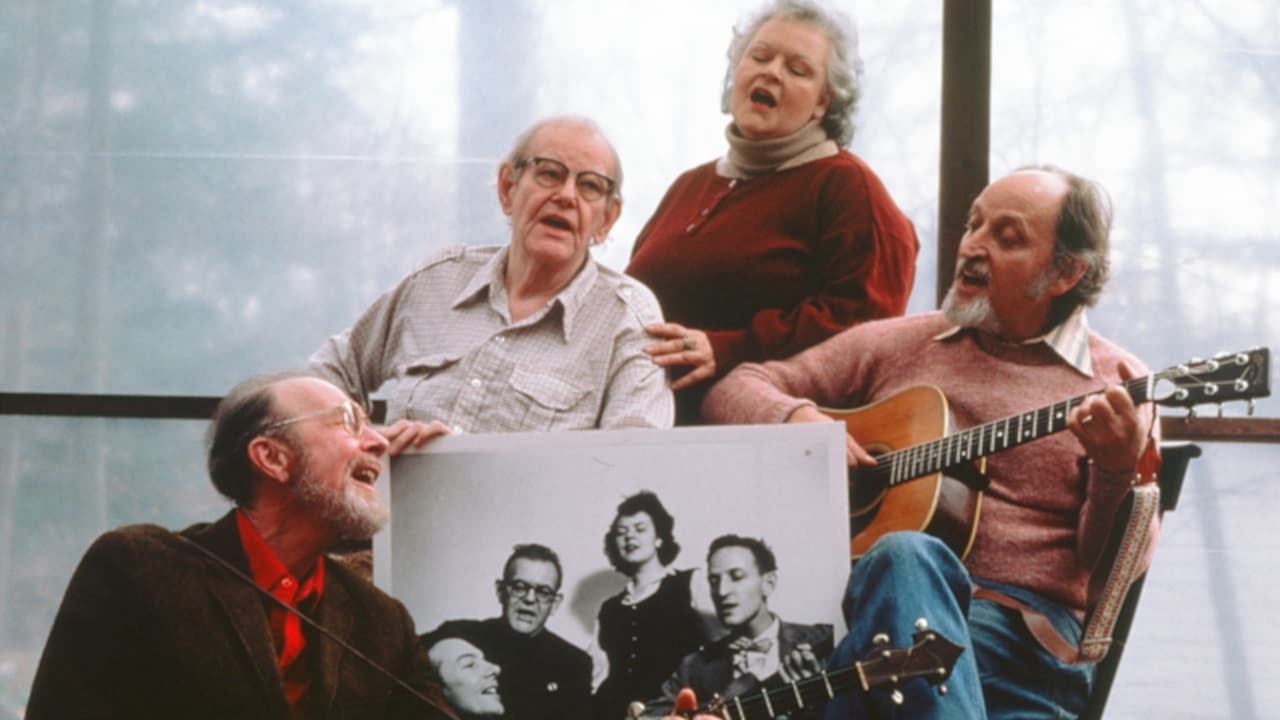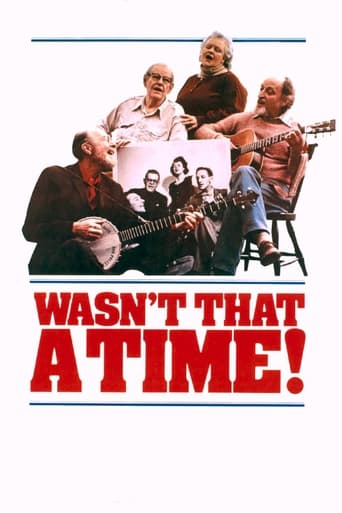

I was a fan of the Weavers from the mid 50's onward. They were an American original, and America did them dirt during the McCarthy era. When this film hit the theaters in limited release in the 80's I ran to see it. And I was not disappointed. It is warm, human, filled with nostalgia and a lasting tribute to them. I remember sitting in the theater after the credits just wishing there was more, and left knowing that an era had ended.
... View MoreOthers here have sung the praises of this great, spiritually uplifting film, so I can't add too much. I'm moved to write because the film has finally been released on DVD, via PBS. Right now, it's only available as a pledge "gift" (meaning one needs to make a substantial donation to PBS). Hopefully in the future, the disc will be available as a mail-order item from PBS and will appear in their retail store locations.The film is a great documentary about the Weavers staging one last concert at Carnegie Hall. It's a wonderful portrait of show business and of aging with grace. Not only is it the best documentary I have ever seen, it's one of my ten favorite movies of all time, from any category.
... View MoreA wonderful movie.Movies are always subjective. We all try to pretend to be objective about the movies we see, to pretend that we judge them on the sheer filmmaking ability they display and not on anything to do with us: our lives, our sentiments, our politics, our histories. Of course that's not true, but in the interests of fairness I'll divide this review in two:As a movie--As a movie, "Wasn't That a Time" is a simply made, well-constructed documentary about a the reunion of The Weavers, a four-person group of singer/musicians who helped bring about the public revival of interest in folk music that blossomed in the fifties and sixties. It features much of their music as it illustrates their history as a group, from their initial success to their subsequent blacklisting, and on to their triumphant comeback(s). It is narrated with self-deprecating humor and tremendous charm by Lee Hays, the bass singer of the group, who, having already lost his legs to diabetes, died shortly thereafter. The concert footage is exceptional and the interviewees are entertaining and informative. The whole thing is as entertaining and funny and fun as all get-out.As for me--Gosh.Most of the folksingers who came along in that fifties/sixties boom were college kids or young musicians who wanted to "join the scene" or take a political stand or simply make a hit record. Some, like the Kingston Trio, took a few tunes, performed them with spirit, made a few hits and vanished again; some, like Dylan, recreated themselves as inheritors of a great tradition and went on to forge something new. The Weavers came from the generation before-- they had grown up in families of laborers or had labored themselves-- Hays, for example, had been a migrant farmhand and a roving preacher, among other occupations. They had gone where the trouble was, to strikes, to mines, to migrant camps-- they had sung the songs back to the people who made them, the workers and the farmers.The Weavers were born of an old-time bedrock unionizing leftism that McCarthy and the HUAC nearly erased from the American past. At one point, at a neighborhood picnic, they sing one of the old-time union songs-- a pragmatic warning to the worker: "Keep your eye upon the dollar..." When they finish Hays wryly adds: "We will now pass out among you...." The opening statement to a passing-of-the-hat that an organizer might have done at a laborers' meeting back in the days when unions had to be fought for, and paid for, against real violence and big moneyed interests. It's a joke, of course, and the audience laughs, but you know Hays has said that before, under different circumstances.I was born in 1970, an early Gen-X-er. My parents were older than those of most of my age-- children of the Depression, old-school liberals. The Weavers' albums were prominent among the collection of records they had acquired over the years, and I listened to them over and over, thrilling as Seeger's voice hit the high notes on "Michael, Row the Boat Ashore," and laughing at "The Talking Blues."The Weavers are part of a history that has gone now-- erased by television, computers, George Lucas, the New Economy, etc. America is simultaneously the country with the least appreciation of its own history and the most reason to celebrate it. Seek out this film, whatever your politics or age, and learn from it. It does not itself explore much in the way of history, but the Weavers themselves embody it: a solid, funny, down-to-earth, committed collective voice from the past. Not to be missed, and not to be forgotten.
... View MoreWhen this movie was released in 1982, I was living in Dallas, Texas - not exactly a hotbed of radicalism. I hopped on my bicycle and pedaled to a Tuesday matinee performance at one of the many multiplexes then springing up around the country. I bought my ticket, soda, and popcorn, then settled down for the 1:30 pm show. The time passed -- nothing happened. At 1:45 I went back to the lobby and asked when "Wasn't That a Time" was supposed to start. The manager's response was priceless - "I'm sorry, sir, I didn't realize there was anyone in that theatre. I'll start it right away." Thus, my first viewing was a private showing in a 200-seat theatre. When home-video became popular, this was one of the first tapes I bought, and I still have it. For old folkies / lefties, you need no persuasion - after all, it's The Weavers. If you're fascinated by the McCarthy Era, this is a "light-hearted" documentary about blacklisting in the entertainment industry. If you wonder how this little documentary has scored so high among its few viewers, then search around for a copy. You will be thoroughly entertained by four people who obviously love what they are doing - lifting their voices in song and spreading their message of tolerance throughout mankind. Lee Hays - the brains behind the group and behind the movie - certainly knew he was dying as he assembled his cohorts for one last get-together at his farm, which turned into an incredible reunion at Carnegie Hall. The voices may waiver, but the emotions are more powerful than ever. Ronnie Gilbert's duet with Holly Near about "The Disappeared" in Chile ("Hay Una Mujer") will raise the hair on the back of your neck. Pete Seeger and Fred Hellerman never sounded better. All of the voices belting out the title tune during rehearsal even surprise the singers - there's a sudden silence when they finish like they can't believe what they've just sung. And if these 'modern' versions of "Good Night, Irene" and "If I Had a Hammer" don't get you singing along, you haven't a musical molecule in your body. I give highest praise to this movie. It's a classic to be shared with friends and family alike. For people who say "I just don't like documentaries," this will change their minds.
... View More